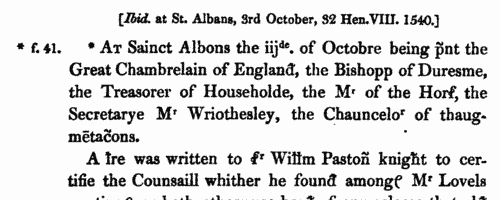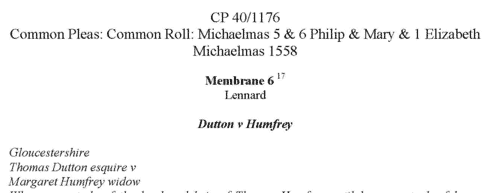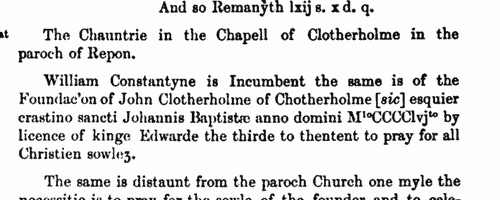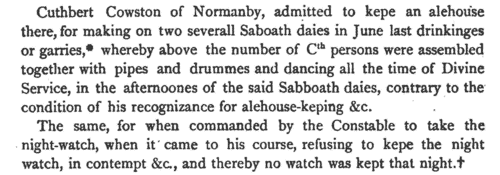Bowland Surname Ancestry ResultsOur indexes 1000-1999 include entries for the spelling 'bowland'. In the period you have requested, we have the following 67 records (displaying 11 to 20): Single Surname Subscription | | | Buying all 67 results of this search individually would cost £360.00. But you can have free access to all 67 records for a year, to view, to save and print, for £100. Save £260.00. More... |
These sample scans are from the original record. You will get scans of the full pages or articles where the surname you searched for has been found. Your web browser may prevent the sample windows from opening; in this case please change your browser settings to allow pop-up windows from this site. Liegemen and traitors, diplomats and spies
(1540-1542)
The Privy Council of England dealt with many delicate and important matters of state. The surviving records date back as early as the 14th century, but Henry VIII on 10 August 1540, with the advice of the council, ordered that the council should have its own clerk 'to write, entre and registre all such decrees, determinacons, lettres and other such things as he shuld be appoynted to entre in a booke, to remayne alwayes as a leger, aswell for the dischardge of the sayd counsaillours touching such things as they shuld passe from tyme to tyme, as alsoo for a memoriall unto theim of their owne procedings'. The register from that date to 8 April 1542 was transcribed for the Commissioners of the Public Records by sir Harris Nicolas, and published in 1837. Although the council often dealt with petitions from aggrieved subjects, its main function was to oversee internal and external security.BOWLAND. Cost: £4.00.  | Sample scan, click to enlarge

| Tenants, founders and incumbents of Yorkshire chantries
(1546-1548)
Chantries were established to perform services for the souls of their founders and other faithful dead, including annual obits and anniversaries at which alms were usually distributed. The chantries could be at an existing altar in a parish church, a new altar in a side chapel of an existing church, in a new chapel in the churchyard or some miles from an existing church: few were founded before 1300, and most date from 1450 to 1500. Hospitals were places provided by similar foundations to receive the poor and weak; there were also religious guilds, brotherhoods and fraternities, and colleges (like large chantries at which three or more secular priests lived in common). An Act of Parliament of 1545 gave king Henry VIII the power to dissolve such chantries, chapels, &c., the proceeds to be devoted to the expenses of the wars in France and Scotland. Commissioners were appointed 14 February 1546 to survey the chantries and seize their property, and from 1546 to 1548 the commissioners produced these certificates giving brief details of the establishment and nature of each foundation, with an inventory of valuables and rental of lands. The individuals named in the certificates are thus the founder, the present incumbent, and the tenants whose rents provided the chantry's income. All the surviving certificates were edited by William Page for the Surtees Society, and published from 1892.BOWLAND. Cost: £6.00.  | Sample scan, click to enlarge

| Tradesmen of York
(1272-1558)
No man or woman could trade in the city of York without having obtained 'freedom' of the city.Their names were recorded on the 'Freemen's Roll', or Register of the Freemen of the City of York, which contains about 19,900 names for this period. A list of names was prepared for each year, the year being here reckoned as starting at Michaelmas (29 September) until 1373, and thence at Candlemas (2 February). Each annual list starts with the name of the mayor and the camerarii or chamberlains. The chamberlains were freemen charged with the duty of receiving the fees of the new freemen; of seeing that only freemen traded in the city; and of preparing this roll, which was compiled from the names on their own account books from the receipts for the fees. There are three groups of freemen: those who obtained freedom after serving out an apprenticeship to a freeman; the children of freemen; and those who claimed freedom by 'redemption', i. e. by purchase or gift from the Mayor and Court of Aldermen.
BOWLAND. Cost: £2.00.  | Sample scan, click to enlarge

| Wiltshire Entries in the Common Pleas (1558)
The Common Roll of the Common Pleas records litigation before the justices de Banco from throughout England.
BOWLAND. Cost: £8.00.  | Sample scan, click to enlarge

| Essex Feet of Fines: Hilary 45 Elizabeth
(1603)
Abstracts of Essex pedes finium - law suits, or pretended suits, putting on record the ownership of land.BOWLAND. Cost: £4.00.  | Sample scan, click to enlarge

| Inhabitants of Ripon
(1354-1609)
In 1888 the Surtees Society published, as the 3rd volume of Memorials of the Church of SS Peter and Wilfrid, Ripon, a collection of extracts from a variety of sources relating to the minster - a copy of the appropriate section from the Valor Ecclesiasticus of 1535-6; chantry certificates of 1546-7; ministers' accounts of 1547-9; fabric rolls (giving accounts of expenditure on the buildings) from 1354 to 1542; a paper book of about 1520; treasurers' rolls from 1401 to 1485; chamberlains' rolls from 1410 to 1558; an inquisition of 1609 (from the Duchy of Lancaster archives); and extracts from the diocesan archives of 1567 to 1580. The people that appear in these records are not only the clergy, but also workmen maintaining and repairing the fabric, local tenants, and the names of the deceased whose obits incurred small payments to the church.BOWLAND. Cost: £4.00.  | Sample scan, click to enlarge

| London Marriage Allegations
(1521-1610)
London, Essex and part of Hertfordshire lay within the diocese of London. In the later 17th century the individual archdeaconry courts issued marriage licences, but for this period the only surviving material is from the overarching London Consistory court. The main series of marriage allegations from the consistory court starts 7 December 1597, and these were extracted by Colonel Joseph Lemuel Chester; Colonel Chester then discovered earlier material, back to 5 January 1521, in Vicar-General's Books of the Principal Probate Registry. The notices in these books were much briefer, but as well as extending back so much earlier, they included additional material for 1597 onwards. All this he collated with the consistory court extracts, and the text was edited by George J. Armytage and published by the Harleian Society in 1887. A typical later entry will give date; name, address and occupation of groom; name, address and condition of his intended bride, and/or, where she is a spinster, her father's name, address and occupation. Lastly we have the name of the church where the wedding was going to take place; or the words Gen. Lic. signifying a general or open licence.BOWLAND. Cost: £4.00.  | Sample scan, click to enlarge

| Quarter Sessions for the North Riding of Yorkshire
(1605-1612)
The Quarter Sessions minute books for the North Riding from April 1605 to July 1612 were edited by the Rev. J. C. Atkinson for the North Riding Record Society and published in 1884. This is a calendar of sessional orders, minutes of criminal cases, memoranda and other entries of record concerning the administration of the riding, for the quarter sessions and special sessions held at Thirsk, Stokesley, Richmond, Malton, Helmsley, Northallerton and Topcliffe. Recusants (persons refusing or neglecting to attend parish church services) are listed in the summary of prosecutions on pages 4-5, 10, 17, 21, 42, 55-56, 61, 65, 69, 72, 79, 82, 95, 99, 113-115, 122, 131, 153-155 and 176. BOWLAND. Cost: £4.00.  | Sample scan, click to enlarge

| Lancashire and Cheshire Marriage Licences
(1624-1632)
Licences for intended marriages in Chester archdeaconry, which covered Cheshire and Lancashire south of the Ribble (by far the most populous part of that county)BOWLAND. Cost: £4.00.  | Sample scan, click to enlarge

| Wills proved at York: Names of Testators
(1627-1637)
The diocese of York comprised most of Yorkshire, and Nottinghamshire: the York Exchequer court was the ordinary probate jurisdiction for the Yorkshire part of the diocese, but some wills from Nottinghamshire and other parts of the province of York were also proved there. Dr Francis Collins compiled this index to the transcribed wills of the Prerogative and Exchequer Courts in the York registry proved from 1627 to 1637. The date on the left is that of probate; the testator's full name is then given (surname first), parish or place of abode, and sometimes occupation, and date that the will was executed; and volume and folio number where it the transcript commences. The Act Books were used by Dr Collins to supply deficiencies in the information from the transcripts.BOWLAND. Cost: £2.00.  | Sample scan, click to enlarge

|
Research your ancestry, family history, genealogy and one-name study by direct access to original records and archives indexed by surname.
|












